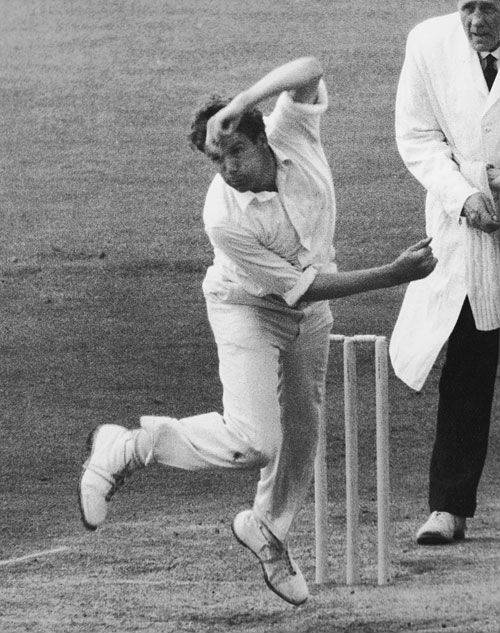When Harold Met Wigston
Wigston C.C. v Harold Rhodes (4.7.65)
A village encounter against England’s fastest bowler
Early in the morning of July 4th 1965, having read the main items relative to cricket in the ‘Sunday Times’ I was drawn to a small insertion tucked away in the bottom left corner of the page, the heading of which read simply, ‘Harold Rhodes to play for Cromford’.
This particular player, acknowledged as the fastest bowler in the land had been omitted from the Derbyshire XI due to his suspect action and the article written by the Cromford Meadows President, mentioned that this game would help to keep him in trim. He further added that he did not expect Harold to be ‘called for throwing’ in this particular match. Not only was he unlikely to be ‘called’ by our own umpire, Wigston’s President John Lawton, due to his arm appearing as a blur, but also such a happening had been anticipated and nullified before the game began.
Arriving at Cromford’s lovely ground, we were met at the gate by the aforementioned ‘Times’ correspondent who informed us that he understood the match would only take place if we agreed not to ‘call’ the star player for throwing or for any other transgression of the laws of the game and in return he would not appeal for any ‘leg-before’ decisions should he hit us instead of the stumps and to this we agreed for a number of reasons.
Firstly, a crowd of approximately 1000 people had turned up to view the slaughter and we had no wish to appear other than accustomed to batting against such folk. Secondly, most of the national daily papers had sent reporters to witness the possibility of our umpire further impeding the career of a man England badly needed. Thirdly, the umpire himself had no desire to become involved in events that might have led to him becoming a national notorious figure.
So all was agreed, the coin spun and the risk to Wigston lives and limbs put off till after tea. The game proceeded at rather better than the going rate for such a match. Wigston’s bowlers kept a tight grip on the game and the fielding in front of such a crowd perfectly adequate. The star attraction, going in at number five was caught quite brilliantly in the slips after contributing only four runs. In retrospect we consider this may have been our big mistake. Should we have let him get 100 or so? Working on the theory that he might not have wanted to bowl all afternoon as well. But alas the deed was done and the innings closed for a modest 112 with twenty minutes to spare before tea was served.
During this period 16 runs were on the board with all Wigston’s wickets intact and the tea interval was the usual jovial affair of eating as fast as decency allowed amidst the relief that Harold did not intend to bowl flat out after all.
On the resumption however, the great man had other ideas and started his run from the sightscreen, contrived to hit the stumps with apparent ease on ten occasions in the next half-hour. The author (also the not out batsman) freely confesses to not running easy two’s that fled off the bats of others in the event his partner might have declined the second run. He noticed that the only player to be hit was limping alarmingly. This player would proudly show the giant bruise for many a week afterwards.
For all the damage he did, we found Harold Rhodes to be an extremely pleasant man and few of us were really sorry that he was at Cromford, rather than Maidstone on that memorable day.
Author: Jim Colver





